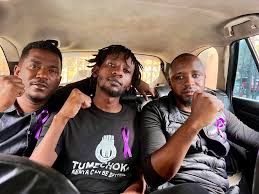The ODPP has declined to charge Boniface Mwangi and two other human rights activists with creating a disturbance in a manner likely to cause a breach of peace, a decision that led to their release following their arrest over the “Occupy Parliament” protest.
Mwangi, Mathias Shipeta and Ngatia Kimathi were released after being detained for hours on Wednesday at the parking lot of the Milimani Law Courts in Nairobi, where action was to be taken against them.
The three were apprehended on Tuesday afternoon while participating in the anti-Finance Bill protests in Nairobi, with their hands chained to a cart carrying a giant symbolic briefcase labelled ‘Finance Bill’.
They were locked up in police cells until Wednesday evening when they were released without being charged.
The Office of the Director of Public Prosecutions said there was insufficient evidence to charge the three in court and returned the police file to the Inspector General of Police. In it was a recommendation for another charge of taking part in an unlawful assembly in contravention of Section 78(1) as read with 79 of the Penal Code.
In his response letter, the DPP explained that, upon an independent and thorough review of the file and with reference to the DPP Guidelines on the Decision to Charge, the evidence presented had not met the threshold to warrant approval of the proposed charges.
The DPP wrote to Senior Sergeant Walter Oyel of the Kamukunji office of the Directorate of Criminal Investigations (DCI), the officer investigating the case.
To prove the first charge of creating a disturbance, the police needed to show that the three activities created a disturbance in a manner that was likely to cause a breach of the peace.
“For the offence (of creating a disturbance) to be adequately proven, the prosecution must show that there was a brawl, caused by the accused persons or that the accused created a disturbance in such a manner as is likely to cause a breach of the peace,” stated assistant DPP Dorcas Rugut.
“A brawl is defined as a rough or noisy quarrel or fight. It would thus behove the evidence presented to demonstrate that the suspects, in their manner of acting, either brawled, fought or created a disturbance. The evidence demonstrates that the suspects were carrying placards and it has not been demonstrated that their mannerisms created a breach of peace,” she added.
In the second count, the DPP argued that the charge was faulty as it failed to disclose the offence the suspects intended to commit.
“In the alternative, no evidence has been presented to show that when the suspects assembled, they conducted themselves in a manner that caused reasonable fear that a breach of peace had or was likely to occur. Further, the evidence presented does not also state that, as a result of the “unlawful assembly,” any report of theft, loss, or destruction of property was made.”
“Further, the evidence presented also does not state that, as a result of the ‘unlawful assembly’ any report of theft, loss, or destruction of property was made.”
Further, the DPP questioned why the Occurrence Book records OB/64a/18/06/2024 and the police report filed after the arrest of the three had five names but the draft charge sheet only contained three.
“The statements in the files refer to only three suspects, begging the question of what happened to the other two suspects. Consequently, the DPP directs that the evidence presented has not met the evidentiary threshold to warrant approval of the proposed charges,” the prosecutor said.
“Consequently, the DPP directs that the evidence presented does not meet the evidential threshold to warrant the approval of the proposed charges,” she added, dismissing the file along with the charges.
Lawyers representing Mwangi and the other two, Hosea Manwa and Stephen Mbugua, joined activists in camping at the court premises in a demand for their release.
Manwa had demanded that the three be released since the government was not ready to charge them.
However, Milimani Chief Magistrate Bernard Ochoi said he could not deal with a matter that was not properly before him and told the lawyers to wait for what the ODPP’s decision.
More than 300 protesters were arrested during the protests that sought to force parliament not to pass the controversial bill that Kenyans say will worsen their already dire economic state.
The Law Society of Kenya (LSK) has since pledged to take legal action against individual police officers for making a peaceful protest chaotic.
“We condemn the outright contempt by the police for the Constitution and the people of Kenya. The running battles and use of teargas on protestors that we have seen images of this morning are a despicable affront to the rule of law,” LSK President Faith Odhiambo said in a statement on Tuesday.
At the same time, the Independent Policing Oversight Authority (IPOA) has confirmed receiving complaints of police using excessive force and recordings of two incidents of injuries to officers during the Tuesday protests.
“IPOA recommends that the service upscale its capacity towards technology-driven surveillance, including drone technology and body cameras, for enhanced accountability during public order management,” said IPOA Chairperson Anne Makori.
The organisation also refuted claims that an officer deployed to disperse the protesters was a member of staff.
It further said it was monitoring police conduct during the protests set to continue in various parts of the country on Thursday and would release a report on its findings.
After the launch in Nairobi, the protests took place in Mombasa on Wednesday, with residents braving torrential rains.
The demonstrators, predominantly young people, as was the case in the capital, voiced strong opposition to the bill, calling for its complete overhaul and the initiation of a new public participation process.

























































